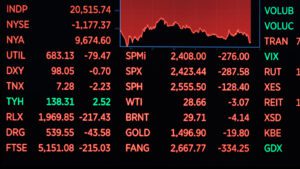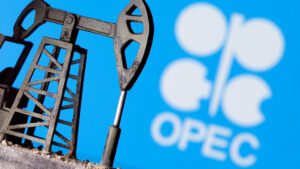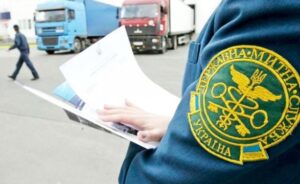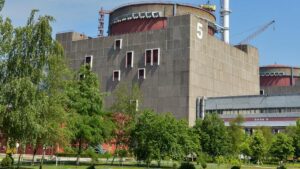Average monthly wage by region in Jan 2022, UAH

SSC of Ukraine

The exception is Hong Kong’s Hang Seng, which fell more than 1.5% by 8:31 AM ET.
The decline leaders are shares of automotive companies Geely and BYD, which lost 6.3% and 5.3%, respectively. On Friday it became known that the investment company of American billionaire Warren Buffett Berkshire Hathaway continued to reduce its stake in BYD and sold the second stake in the automaker in two weeks.
In addition, papers of online retailers JD.com Inc. are getting cheaper. (-3.4%) and Alibaba (-2.7%), consumer electronics manufacturer Xiaomi Corp. (-2.9%), Internet giant Tencent Holdings Ltd. (-3.1%).
Following the increase in oil prices, stock prices of representatives of this industry are growing: PetroChina Co. (+1.9%), China Petroleum & Chemical Corp. (+1.7%) and CNOOC (+1.5%).
The Chinese authorities are introducing restrictive measures and continue mass testing for COVID-19 among more than 20 million residents of the city of Chengdu, the administrative center of Sichuan province. It is the sixth most populous city in the country. In addition, measures to restrict movement were taken in Shenzhen.
Business activity in China’s industrial sector rose for the third month in a row in August, according to the Purchasing Managers’ Index (PMI) calculated by Caixin Media and S&P Global.
While the PMI slipped to 55 from a 15-month high of 55.5 in July, it remained above the 50-point mark, which indicates an increase in activity in the sector. At the same time, analysts expected the index to fall to an average of 51 points, according to Trading Economics.
Consolidated PMI last month decreased to 53 points from 54 points in July.
The Chinese Shanghai Composite index is almost at the level of previous trading, as well as the Japanese Nikkei 225.
The price of securities of the Japanese oil company Inpex is growing by 0.7%, non-ferrous metals producer Sumitomo Metal Mining Co. – by 1.9%, investment technology company Softbank Group – by 0.15%.
Asia’s largest clothing retailer Fast Retailing is down 1%, automaker Nissan Motor Co. – by 1.6%.
The South Korean index Kospi by 08:20 Moscow time fell by 0.3%.
Shares of one of the world’s largest manufacturers of chips and consumer electronics Samsung Electronics Co. fell by 1%, while automaker Hyundai Motor – rose by 1.8%.
The Australian indicator S&P/ASX 200 added 0.2% since the market opened.
The market value of the world’s largest mining companies BHP and Rio Tinto rose by 2.6% and 1.8%, respectively.
Retail sales in Australia rose 1.3% month-on-month in July to a record A$34.67 billion, final data show. This is the biggest increase since March.

Oil prices rise on Monday ahead of the OPEC+ meeting, traders are assessing the possibility of cutting production after recent statements by Saudi Energy Minister Prince Abdulaziz bin Salman about the possibility of such a move.
Most experts still believe that OPEC + will not reduce the oil production plan for October, Bloomberg notes. JPMorgan analysts explain this opinion by the fact that the summer surplus of raw materials in the world market can quickly turn into a deficit.
The price of November futures for Brent oil on the London ICE Futures exchange by 8:15 pm on Monday is $95.06 per barrel, which is $2.04 (2.19) higher than the closing price of the previous session. As a result of trading on Friday, these contracts rose by $0.66 (0.7%) to $93.02 per barrel.
The price of futures for WTI oil for October in the electronic trading of the New York Mercantile Exchange (NYMEX) is $88.66 per barrel by this time, which is $1.79 (2.06%) higher than the final value of the previous session. By the close of the market on Friday, the value of these contracts increased by $0.26 (0.3%) to $86.87 per barrel.
As a result of the past week, Brent fell by 6.1%, WTI – by 4.6%.
In Europe, the energy crisis is intensifying against the background of the suspension of Russian gas supplies via the Nord Stream gas pipeline. On Friday evening, Gazprom reported that the maintenance of the only working turbine of the Nord Stream revealed “gross violations” and the gas pipeline would not work without their elimination.
Shortly before this, the G7 countries approved a plan to introduce a price ceiling for oil exported by Russia. To implement this plan, the G7 countries intend, in particular, to ban insurance of tankers with Russian oil if it is sold at a price above a certain limit.
“We believe that Gazprom’s decision to extend the shutdown of Nord Stream supplies from the originally announced three days indefinitely is inextricably linked to the G7’s adoption of the price cap plan,” said James Whistler, managing director of Vanir Global Markets Pte. Bloomberg.
Although the G7 countries are striving to maintain the supply of Russian energy resources to the world market, while reducing Russia’s income, “in reality, everything happens the other way around,” the expert says.

The Government on Friday approved a bill that brings the Customs Tariff of Ukraine in line with the requirements of the International Convention on the Harmonized Commodity Description and Coding System in the 2022 version, the Ministry of Economy reported.
The agency explained that the current Customs Tariff of Ukraine is built on the basis of such an international system of the 2017 version, while most countries of the world (China, the USA, the EU, Turkey, Switzerland) have already switched to the 2022 version.
In this regard, there are a number of complications associated with differences in commodity codes in the customs clearance of imported products or when comparing the customs statistics of Ukraine and trading partner countries.
“Ukraine is adapting to international standards for the classification of goods. We need this in order to increase our own exports, enter new markets, strengthen competitive advantages in world trade,” First Deputy Prime Minister Yulia Sviridenko, Minister of Economy, said in the release.
The Ministry of Economy clarified that if the bill is adopted, more than 350 changes will be made to commodity codes, mainly in relation to agricultural goods, chemical, forestry, textiles, non-ferrous metals, engineering, transport, etc.
The report clarifies that the new customs tariff does not provide for changes in the rates of import duty on goods.

Power unit No. 5 of the Zaporizhzhya NPP, which was shut down in an emergency on September 1, is back in operation, Energoatom reported.
“Today, September 2, 2022, the 5th power unit of the Zaporizhzhya NPP, which was turned off on September 1 in the morning as a result of another mortar attack by the Russian occupation forces at the ZNPP site, was connected to the power grid at 13:10,” Energoatom’s Telegram channel reported. on Friday.
According to the report, the increase in power continues.
“The station has two power units (No. 5, 6 – ER), which produce electricity for the needs of Ukraine. There are no comments on the operation of equipment and security systems,” the company said.

Export of goods from Ukraine in August increased by 13.9% compared to July to $3.363 billion, while imports decreased by 2.3% to $4.416 billion, the Ministry of Economy reported on Friday.
According to him, as a result, the negative balance of Ukraine’s foreign trade in goods last month decreased to $1.053 billion from $1.569 billion in July and $1.549 billion in June.
“The growth in exports is associated with the partial unblocking of the ports of Greater Odessa. This made it possible to significantly increase the volume of exports of Ukrainian goods. As a result, transportation by sea increased by 85% and amounted to almost 2.9 million tons,” the Ministry of Economy noted.
It indicated that in physical terms, in August 2022, the volume of Ukrainian exports increased by 25%, to 7.296 million tons, while imports decreased by 1%, to 1.961 million tons.
According to the Ministry of Economy, Ukraine exported more than 3 million tons of goods by rail, and 1.36 million tons by road.
At the same time, exporters receive the largest revenue from goods exported by road – $1.48 billion, sea cargo cost $995 million, and rail cargo – $788 million.
“Ukraine relies on the export model of economic growth. Before the full-scale war, our exports amounted to 35% of GDP. The goal of the Government and the Ministry of Economy is to raise it to 50%. 75% of exports should be finished goods and services,” the words of the First Vice -Prime Minister – Minister of Economy Yulia Sviridenko.
The leaders in terms of export value in August were, in particular, sunflower oil – $443 million and corn – $347 million, whose export volumes increased by 30%, to 366 thousand tons and by 31%, to 1.5 million tons, respectively, while export of sunflower seeds amounted to $71 million.
In addition, the list of leaders includes rapeseed – $305 million, including exported 665 thousand tons of this crop of the new crop, and wheat – $213 million, the export of which in August increased 2.3 times compared to July, to 880 thousand tons.
Last month, soybean exports jumped by 30% to 148,000 tons, and in monetary terms to $62 million, while revenue from electricity exports doubled to $73 million, which was the result of the successful integration of the Ukrainian energy sector into ENTSO-E, an energy system of the European Union.
“It is important that confectionery processing products demonstrate a stable upward trend: bakery +19.4%, sugar +9.1%, chocolate +25%,” the Ministry of Economy added, without specifying specific indicators.
At the same time, ore exports fell to 1.4 million tons, and in monetary terms – to $172 million, cable products – by 9.8%, to $89 million, poultry meat – to $67 million.